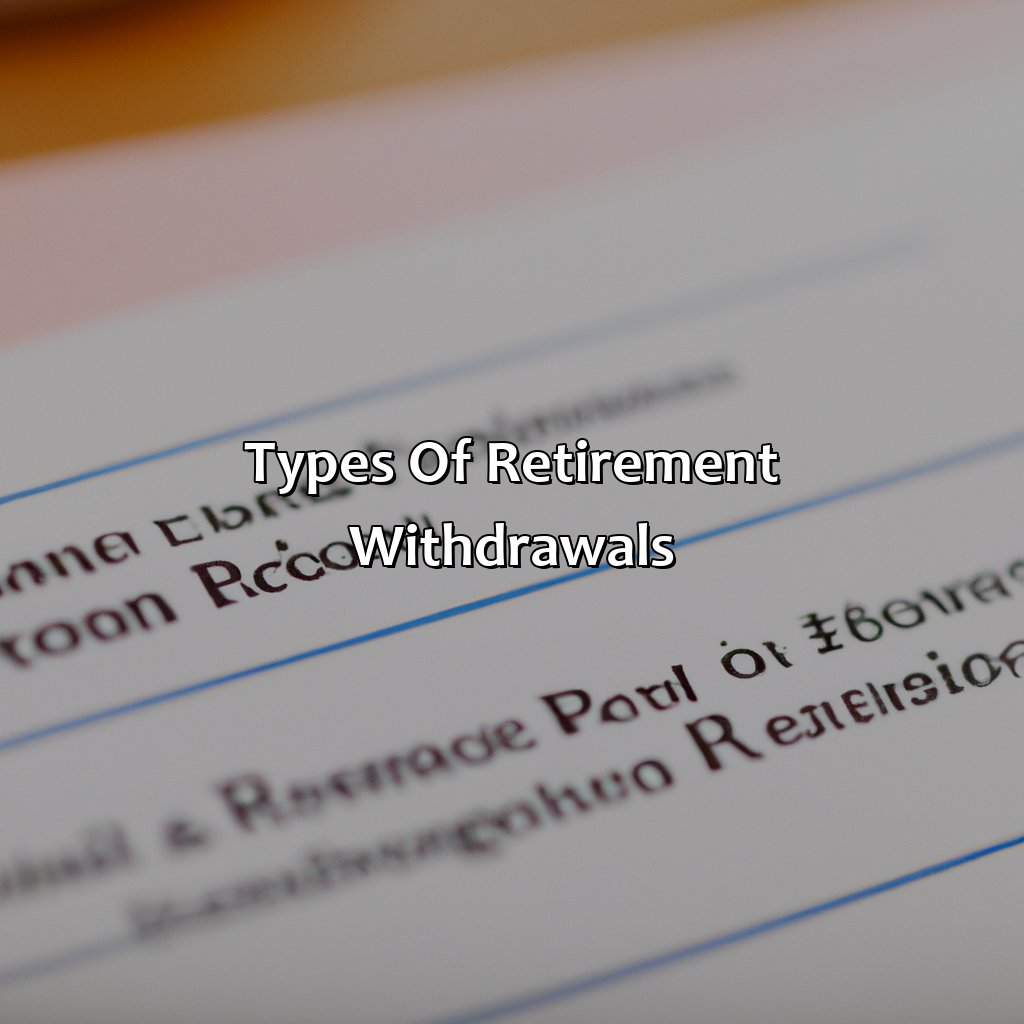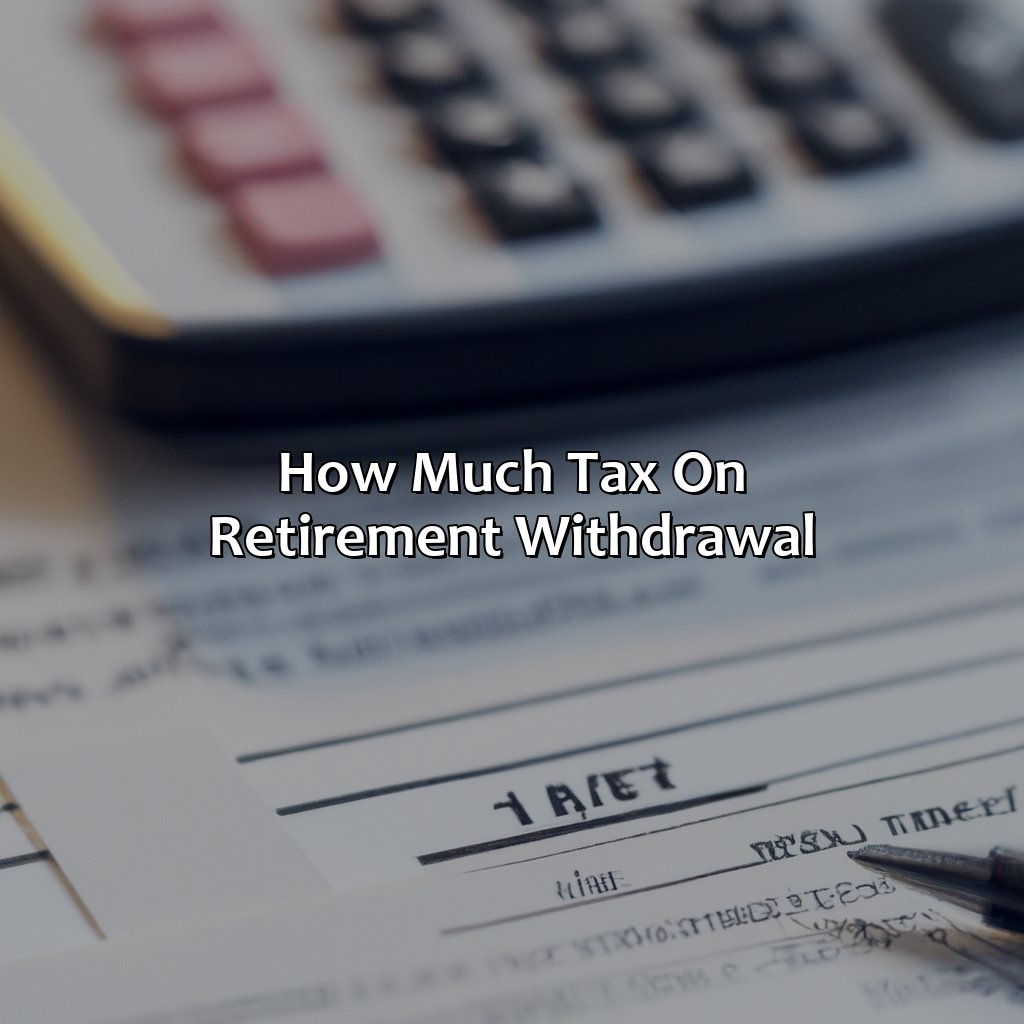How Much Tax On Retirement Withdrawal?
Key Takeaway:
- Retirement withdrawals are subject to both federal and state income tax.
- Traditional IRA withdrawals are taxed as ordinary income, while Roth IRA withdrawals are typically tax-free if certain conditions are met.
- 401(k) withdrawals are also taxable as ordinary income, and may be subject to early withdrawal penalties if taken before age 59 1/2.
- To minimize taxes on retirement withdrawals, consider comprehensive tax planning, taking advantage of tax-efficient withdrawal strategies, and consulting with a financial advisor.
Retirement can be intimidating, especially with all the taxes you have to account for. Are you confused about how much tax you have to pay when you withdraw money from your retirement savings? You’re not alone. Let’s explore the answers together.
Retirement Withdrawal: Understanding Taxes
As you prepare for retirement, it’s important to understand the taxes involved when withdrawing your savings. Knowing the tax implications can help you plan withdrawals wisely and reduce your tax liability. Withdrawing money from a traditional IRA or 401(k) is subject to income tax, while Roth IRA withdrawals are generally tax-free. It’s also important to consider state taxes, as some states tax retirement income differently. Finally, be aware of required minimum distributions once you turn 72, as failing to take the required withdrawal can result in a penalty of up to 50% of the amount not withdrawn.
Pro Tip: Consulting a tax professional can help you navigate the unique tax situations involved with retirement withdrawals.

Image credits: retiregenz.com by James Jones
Types of Retirement Withdrawals
Know which retirement withdrawals to take? Traditional IRA, Roth IRA, or 401(k)? Check out the section “Types of Retirement Withdrawals” in the article “How Much Tax on Retirement Withdrawal?”. Get a brief intro to each one and their benefits. It’ll help you understand.

Image credits: retiregenz.com by Harry Woodhock
Traditional IRA Withdrawals
When it comes to accessing funds from your Traditional Individual Retirement Account (IRA), there are specific withdrawal rules to follow. These withdrawals should be made after reaching the age of 59 and a half, or you may face a ten percent penalty.
One type of withdrawal is a required minimum distribution (RMD), which is an amount that must be taken out each year from your Traditional IRA starting at age 72. The amount is calculated based on your IRA balance and life expectancy.
Another type of withdrawal is an early distribution, which occurs when withdrawing funds before turning 59 and a half. This type of withdrawal can result in a ten percent penalty, in addition to the regular income tax paid on distributions.
It’s essential to understand the different types of withdrawals from your Traditional IRA and their tax implications before making any decisions. Seeking advice from a financial advisor can help you navigate these options more effectively.
Don’t risk missing out on potential savings or facing penalties by making uninformed choices about your Traditional IRA withdrawals. Take the time to educate yourself and make informed decisions about your retirement funds now.
Withdrawals from a Roth IRA are like finding a unicorn – tax-free and seemingly too good to be true.
Roth IRA Withdrawals
One of the many kinds of retirement withdrawals you can make is from a type of account called Roth IRA. This type of account has unique taxation rules compared to traditional IRAs.
The money you contribute to a Roth IRA is taxed upfront, so when you withdraw it, there are no taxes on your withdrawals including any earnings on your investment. However, if you withdraw earnings before five years have passed and before age 59 ½, you may face financial penalties and taxes.
It’s important to note that because you’ve already paid taxes on your contributions, withdrawals from a Roth IRA do not count towards your taxable income. This means that if all your income comes from a Roth IRA withdrawal after you retire, it’s not likely you’ll pay any federal taxes.
I remember meeting an elderly couple who exclusively used their Roth IRA as their primary source of retirement income- and they never had to pay any tax on their withdrawals. They had carefully planned for years prior to their retirement to get the maximum benefits from this type of account.
401(k) withdrawals – because who needs money in retirement, right? Just keep working till you drop.
401(k) Withdrawals
Withdrawals from your tax-deferred retirement account can be complicated. One option is a withdrawal from your 401(k) plan. This type of retirement withdrawal is subject to a range of tax treatments.
When you withdraw money from your 401(k), the amount of tax you pay depends on several factors, including your age. If you are under the age of 59½ and you withdraw before that time, you may be hit with an additional 10% early withdrawal penalty in addition to income taxes.
Additionally, if you withdraw too much money at once, it can bump you up into a higher tax bracket. It’s important to carefully plan how much you’re going to withdraw each year to avoid getting hit with unexpected taxes.
Pro Tip: Consider working with a financial advisor who can help guide you through your retirement distributions and minimize your tax liability.
Say goodbye to your savings, and hello to the tax man – the ugly truth about retirement withdrawals.
Tax Implications of Retirement Withdrawals
Tax implications of retirement withdrawals? Delve into Federal, State, and Early Withdrawal Penalty sub-sections. Each one affects tax on withdrawals in a different way. Be informed – know the tax impact of your retirement withdrawals!

Image credits: retiregenz.com by James Washington
Federal Income Tax
The taxation of retirement withdrawal can be a complex topic to navigate, and it’s crucial to understand how the federal government taxes these payments. The Federal Income Tax is a mandatory contribution, charged based on the recipient’s income and tax bracket. This means that the tax you pay on your retirement withdrawal will depend on how much you withdraw and what tax bracket you fall under.
For example, if you withdraw a large sum of money in retirement, your taxable income for the year could push you into a higher tax bracket, which would increase the amount of federal income tax owed.
It is essential to note that other factors such as Social Security benefits may also affect how much federal income tax is levied on your retirement withdrawal. In some cases, withdrawals may not be taxed at all or receive a reduced tax rate due to provisions within the Internal Revenue Code.
Pro Tip: Check with an experienced financial planner or certified public accountant before making significant withdrawals from your retirement accounts. They can help you understand the potential tax implications of these transactions and create strategies to minimize your overall liability.
State Income Tax: where giving your money to the government feels less like a civic duty and more like a mugging.
State Income Tax
State tax implications on your retirement withdrawals can significantly impact your after-tax income. Most states impose taxation at ordinary rates and may have higher or lower rates than federal taxes. The state you reside in during retirement has a direct effect on the amount of tax deduction from your withdrawal.
Planning early for taxation on retirement withdrawals is vital since some states exempt social security and other retirement funds from taxation, while others levy them. Furthermore, some state laws provide standard or itemized deductions that reduce taxable income resulting in lower state taxes.
Considering State Income Tax while planning your retirement is essential to avoid missing out on possible deductions or exemptions. Researching and consulting professionals can help you minimize tax liability and enhance your financial stability during the post-retirement phase.
Taking money out of your retirement fund early is like breaking up with your future self and giving them a hefty penalty for it.
Early Withdrawal Penalty
Withdrawing your retirement funds early can result in a penalty that reduces your savings. This penalty may vary based on the age of the account holder and the type of retirement plan. The amount of the penalty can also depend on how much was withdrawn and for what reason.
If you withdraw money from your IRA before turning 59 1/2, you may have to pay an Early Distribution Penalty. This penalty can be as high as 10% of the taxable portion of the withdrawal. However, this penalty does not apply if funds are distributed due to disability or certain other life events.
It is important to note that there are exceptions to these rules, and some may be able to avoid paying any penalties altogether. For example, if an individual separates from their employer at age 55 or older, they may avoid an Early Distribution Penalty on distributions from the employer’s plan.
Pro Tip: Always speak with a financial advisor or tax professional before making any decisions regarding withdrawing funds from a retirement account.
Strategies to Minimize Taxes on Retirement Withdrawals
Retirement withdrawal taxes can have a significant impact on your overall financial planning. To reduce the taxes on your retirement withdrawals and maximize your savings, you need to employ effective strategies. Here are some tips to minimize retirement withdrawal taxes:
- Contribute to your retirement accounts to the maximum allowed limit
- Utilize Roth accounts for tax-free withdrawals
- Withdraw funds from multiple accounts based on tax implications
- Plan ahead for Required Minimum Distributions (RMDs)
- Consider charitable donations instead of withdrawal
To further maximize your savings, it is imperative to plan strategically before retirement. This includes analyzing your expected expenses and estimated tax liability, which can minimize unexpected financial burdens that may affect your retirement income.
One additional strategy to consider is to invest in tax-efficient funds that generate lower taxable income, thereby reducing your tax liability. This can be especially effective if you have a diversified portfolio with holdings in different asset classes that have varying tax consequences.
Employing these strategies can significantly reduce the taxes on your retirement withdrawals. By contributing to your retirement accounts, implementing tax-efficiency strategies, and planning ahead, you can create a sustainable retirement income that lasts through your retirement years.

Image credits: retiregenz.com by David Jones
Five Facts About Retirement Withdrawal Tax:
The amount of tax on retirement withdrawal depends on various factors like age, income, and type of retirement account. (Source: Investopedia)
Early retirement withdrawal can attract a higher tax rate and penalties. (Source: SmartAsset)
Generally, withdrawals from traditional retirement accounts are taxed as ordinary income, while withdrawals from Roth retirement accounts are tax-free. (Source: The Balance)
Required Minimum Distributions (RMDs) from traditional retirement accounts must begin at age 72 and are subject to taxation. (Source: IRS)
Tax-efficient investment strategies during retirement can help reduce the tax burden on retirement withdrawals. (Source: Kiplinger)
FAQs about How Much Tax On Retirement Withdrawal?
How much tax will I have to pay on my retirement withdrawal?
The amount of tax you’ll pay on your retirement withdrawal depends on several factors, including your income tax bracket, the amount withdrawn, and whether the withdrawal is considered taxable income.
What percentage of my retirement withdrawal is taxable?
The percentage of your retirement withdrawal that’s taxable will depend on the type of retirement account you have. For example, if you have a traditional IRA or 401(k), the entire withdrawal will be taxed as ordinary income. However, if you have a Roth IRA or Roth 401(k), your withdrawal may not be taxable at all.
Are there any penalties for withdrawing retirement funds early?
Yes, if you’re under 59 1/2 years old and you withdraw funds from a traditional IRA or 401(k), you may be subject to a 10% early withdrawal penalty in addition to any taxes due. However, there are some exceptions to this penalty, such as disability, certain medical expenses, and a first-time home purchase.
Can I avoid paying taxes on my retirement withdrawal?
While it’s not possible to completely avoid paying taxes on a retirement withdrawal, there are some strategies you can use to minimize the tax hit. One strategy is to spread out your withdrawals over several years to stay within a lower tax bracket. Another strategy is to consider converting some of your traditional retirement funds to a Roth account, which will allow you to withdraw tax-free in retirement.
How do state taxes factor into retirement withdrawals?
State taxes can add an additional layer of complexity to retirement withdrawals, as each state has its own tax laws and rates. Some states, such as Florida and Texas, don’t have state income tax, while others, such as California and New York, have high state income tax rates.
Do I need to pay taxes on Social Security benefits along with my retirement withdrawal?
Whether or not you’ll pay taxes on your Social Security benefits will depend on your income level. If your income is below a certain threshold, your Social Security benefits may not be taxable. However, if your income is above that threshold, up to 85% of your benefits may be subject to taxation.
 Checkout this IRS Loophole
Checkout this IRS Loophole 




